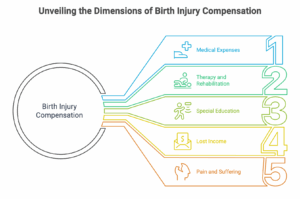The arrival of a new baby is often a joyous occasion. But when a birth injury occurs, it can turn a dream into a nightmare, leaving families overwhelmed and uncertain about the future. If you suspect your child has suffered a birth injury, know that you’re not alone, and help is available.
1. Birth Injury: Understanding the Basics and Potential Causes
A birth injury refers to any harm a baby sustains during labor and delivery. While some complications are unavoidable, others result from medical negligence. Examples include:
- Cerebral Palsy: Often linked to oxygen deprivation during delivery.
- Erb’s Palsy: Nerve damage caused by excessive pulling on the baby’s arm during delivery (shoulder dystocia).
- Hypoxic-Ischemic Encephalopathy (HIE): Brain damage due to lack of oxygen.
- Fractures: Broken bones, especially the clavicle, due to difficult deliveries.
These injuries can stem from various causes, such as:
- Failure to monitor fetal distress.
- Improper use of forceps or vacuum extractors.
- Delayed C-section.
- Medication errors.
2. Recognizing the Signs: Is it a Birth Injury?
Recognizing a birth injury isn’t always straightforward. Some signs appear immediately, while others become evident later. Be alert for:
- Seizures.
- Breathing difficulties.
- Weak reflexes.
- Developmental delays (e.g., difficulty crawling, sitting, or speaking).
- Muscle weakness or stiffness.
- Asymmetrical movements.
If you notice any of these signs, seek immediate medical attention. Early diagnosis and intervention can improve your child’s long-term outcome.
3. The Long-Term Impact of Birth Injuries on Children and Families
The impact of a birth injury extends far beyond the delivery room. Children may face lifelong disabilities, requiring extensive and costly medical care, therapy, and special education. Families grapple with emotional distress, financial burdens, and the challenges of providing ongoing support. A 2023 study by the CDC found that children with cerebral palsy, a common birth injury consequence, incur medical expenses ten times higher than those without.
4. Exploring Your Legal Options After a Birth Injury
If you believe your child’s birth injury resulted from medical negligence, you have legal options. Potential claims include:
- Negligence: Proving the medical staff deviated from the accepted standard of care, causing the injury.
- Failure to Warn: If the medical team failed to inform you of known risks associated with labor and delivery procedures.

A birth injury lawsuit aims to secure compensation for:
- Medical expenses (past and future).
- Therapy and rehabilitation costs.
- Special education.
- Lost income (if you had to reduce work hours to care for your child).
- Pain and suffering.
5. Seeking Expert Help: Medical and Legal Professionals You Need
Building a strong birth injury case requires a dedicated team. Start by consulting with:
- Pediatric Neurologist: To diagnose and treat neurological issues.
- Developmental Specialist: To assess and address developmental delays.
- Birth Injury Lawyer: An attorney experienced in medical malpractice cases.
A qualified attorney will evaluate your case, gather evidence, consult with medical experts, and represent your interests in court.
6. Documenting Your Case and Building a Strong Claim
Thorough documentation is critical. Gather all relevant medical records, including prenatal care records, labor and delivery notes, and your child’s medical history. Keep a detailed journal of your child’s progress, medical appointments, and expenses. This information will serve as evidence to support your claim.
7. Don’t Suffer in Silence: Resources and Support for Families Affected by Birth Injury
Facing a birth injury is incredibly difficult. Remember, you are not alone. Numerous resources offer support and guidance:
- The United Cerebral Palsy Association (UCPA): Provides resources and support for families affected by cerebral palsy.
- Birth Injury Justice Center: Connects families with legal and medical experts.
Many birth injury lawyers offer free consultations and work on a contingency fee basis, meaning you only pay if they win your case.







Nice post. I was checking continuously this weblog and I’m inspired! Extremely useful info particularly the remaining phase 🙂 I handle such info a lot. I was seeking this certain information for a long time. Thank you and good luck.